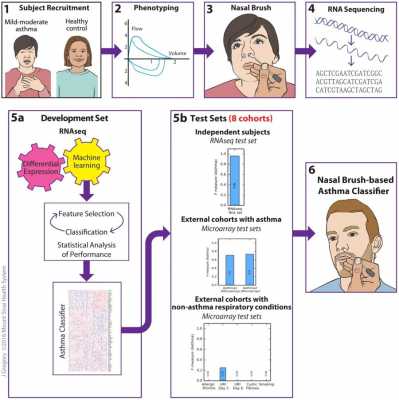Allergies, Asthma, Author Interviews / 15.09.2022
Does Pollen Cause Your Asthma Here’s How To Handle It
Knowing about pollen forecasts might help you understand how much pollen will be released in your area and when....
Knowing about pollen forecasts might help you understand how much pollen will be released in your area and when....
 Beth Hahn, PhD, Director
U.S. Value Evidence and Outcomes,
GlaxoSmithKline,
Research Triangle Park, NC
MedicalResearch.com: What is the background for this study?
Response: Biologic therapies are increasing as a treatment for patients with severe asthma, with multiple therapies approved by the FDA. There is also an increasing understanding of the factors influencing preference for and adherence to biologic therapies for patients with severe asthma; however, little is known about why patients discontinue biologic therapy. In patients who have access to biologic treatment, understanding the circumstances and asthma characteristics associated with discontinuation of biologic therapy may allow for the identification of barriers to treatment success . The objective of this study of cross-sectional physician and patient survey data was to assess the patient characteristics and the given reasons for treatment discontinuation in a US patient cohort with severe asthma treated with biologic therapy.
A total of 117 physicians and 285 patients completed surveys with 70% of patients continuing biologic therapy (N=200). This study included a number of different FDA approved biologics. From the perspectives of the physicians included in the current study (85 providing a rationale for discontinuation), the majority reported a lack of symptom control, particularly shortness of breath (46%), exacerbations (26%) and other chronic symptoms (29%), as a key reason for discontinuing biologic therapy in severe asthma. Symptom control was also key for patients, with these three symptom categories among their top six reasons for biologic discontinuation. The cost of biologic treatment was also an important factor, cited as the 5th most common reason for discontinuation among physicians and the 3rd among patients.
(more…)
Beth Hahn, PhD, Director
U.S. Value Evidence and Outcomes,
GlaxoSmithKline,
Research Triangle Park, NC
MedicalResearch.com: What is the background for this study?
Response: Biologic therapies are increasing as a treatment for patients with severe asthma, with multiple therapies approved by the FDA. There is also an increasing understanding of the factors influencing preference for and adherence to biologic therapies for patients with severe asthma; however, little is known about why patients discontinue biologic therapy. In patients who have access to biologic treatment, understanding the circumstances and asthma characteristics associated with discontinuation of biologic therapy may allow for the identification of barriers to treatment success . The objective of this study of cross-sectional physician and patient survey data was to assess the patient characteristics and the given reasons for treatment discontinuation in a US patient cohort with severe asthma treated with biologic therapy.
A total of 117 physicians and 285 patients completed surveys with 70% of patients continuing biologic therapy (N=200). This study included a number of different FDA approved biologics. From the perspectives of the physicians included in the current study (85 providing a rationale for discontinuation), the majority reported a lack of symptom control, particularly shortness of breath (46%), exacerbations (26%) and other chronic symptoms (29%), as a key reason for discontinuing biologic therapy in severe asthma. Symptom control was also key for patients, with these three symptom categories among their top six reasons for biologic discontinuation. The cost of biologic treatment was also an important factor, cited as the 5th most common reason for discontinuation among physicians and the 3rd among patients.
(more…) Response: Asthma is a chronic, progressive disease driven in part by underlying inflammation and requires long-term control of symptoms. Over time, this chronic inflammation can lead to a decline in lung function.
The Phase 3 open-label extension trial evaluated long-term safety and efficacy of Dupixent treatment in adults and adolescents with moderate-to-severe asthma who had previously participated in a controlled Dupixent clinical trial, including three pivotal trials that lasted between 24 and 52 weeks. With more than 2,200 patients enrolled, the Phase 3 LIBERTY ASTHMA TRAVERSE open-label extension trial is the largest of a biologic medicine ever conducted in asthma.
Dupixent is a biologic therapy that works differently from existing therapies that treat asthma. Dupixent is a fully-human monoclonal antibody that inhibits the signaling of the interleukin-4 (IL-4) and interleukin-13 (IL-13) proteins. Data from Dupixent clinical trials have shown that interleukin-4 (IL-4) and interleukin-13 (IL-13) are key drivers of the type 2 inflammation that plays a major role in asthma. It is the only biologic to demonstrate sustained improvements in lung function and asthma exacerbations across a broad patient population with type 2 inflammation. Dupixent is not an immunosuppressant.
(more…)
Response: Asthma is a chronic, progressive disease driven in part by underlying inflammation and requires long-term control of symptoms. Over time, this chronic inflammation can lead to a decline in lung function.
The Phase 3 open-label extension trial evaluated long-term safety and efficacy of Dupixent treatment in adults and adolescents with moderate-to-severe asthma who had previously participated in a controlled Dupixent clinical trial, including three pivotal trials that lasted between 24 and 52 weeks. With more than 2,200 patients enrolled, the Phase 3 LIBERTY ASTHMA TRAVERSE open-label extension trial is the largest of a biologic medicine ever conducted in asthma.
Dupixent is a biologic therapy that works differently from existing therapies that treat asthma. Dupixent is a fully-human monoclonal antibody that inhibits the signaling of the interleukin-4 (IL-4) and interleukin-13 (IL-13) proteins. Data from Dupixent clinical trials have shown that interleukin-4 (IL-4) and interleukin-13 (IL-13) are key drivers of the type 2 inflammation that plays a major role in asthma. It is the only biologic to demonstrate sustained improvements in lung function and asthma exacerbations across a broad patient population with type 2 inflammation. Dupixent is not an immunosuppressant.
(more…)





MedicalResearch.com Interview with: Bryce Hoffman, MD Allergy & Immunology Fellow National Jewish Health MedicalResearch.com: What is the background for this study? What are the...






